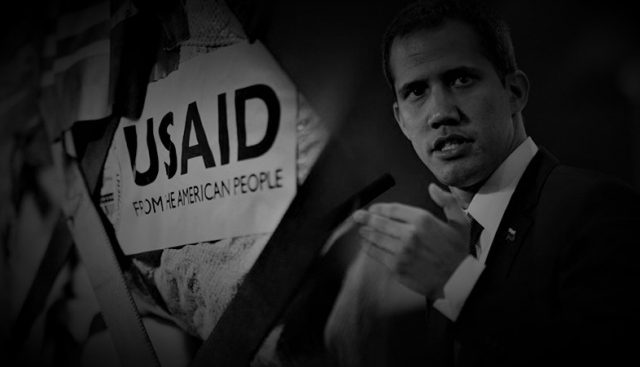The figures published by a group of officials of former deputy Juan Guaidó show that the so-called “interim government” has spent a total of 121.9 million dollars from the so-called «Fund for the Liberation of Venezuela» in one year. The resources granted to attend the «humanitarian crisis» in the country were in those funds.
These amounts are on the list of ‘Disbursements made by loan to the Republic within the framework of the Special Law of the Fund for the Liberation of Venezuela’, published by the Ad-Hoc (parallel) administrative board of the Central Bank of Venezuela (BCV ). But, it has drawn attention because there are expenses not detailed and whose discretionary use shows opacity.
The Ad-Hoc board was appointed in July 2019 by the board of directors of the National Assembly, – presided over by Guaidó that same year, when he proclaimed himself «president in charge» – and it carried out a series of actions to «safeguard» Venezuela’s resources abroad, promote sanctions against their own country and ignore the legitimacy of the Government of Nicolás Maduro, describes a report by Nathali Gómez for RT.
After that appointment without parliamentary validity, due to the fact that Parliament was in contempt since 2016, the Supreme Court of Justice (TSJ) declared the nullity of the parallel board of the BCV and warned that its members were committing crimes of usurpation of functions, corruption, organized crime and terrorism.
Almost two million dollars for Guaidó
Of the total of 121.9 million dollars of the Fund that has disbursements made between 2020 and 2021, 1.9 million have been for the «presidency» that Guaidó would exercise from 2019 until an ‘indeterminate time’; 3.6 million for the parallel «chancellery» and 4.6 million more for the «National Assembly», which officially ended its term in January this year. The disaggregation of these figures is not in the document.
Regarding these resources, the economist and university professor Francisco Rodríguez wrote in a thread posted on his Twitter account that «among the most relevant amounts are» 27.9 million dollars for ‘Humanitarian Attention’; 20.7 million for the ‘Health Heroes Program’ and 16.7 million dollars for the ‘Fund for the Defense of Democracy’.
The management by Guaido and his parallel government of the resources for humanitarian care and social programs has also been questioned before. Last July, Guaidó himself affirmed, in a series of trills, that the «dictatorship» wanted «to destroy the confidence of Venezuelans in everything with propaganda». This assertion was made after the editor-in-chief of The Freedom Post, not related to the Venezuelan government, asked him (Guaidó) where 98% of the money for «humanitarian aid» was.
Financing political parties
In his trills, Rodríguez draws attention to the so-called ‘Fund for the Defense of Democracy’ because ‘it includes the payment of bonds as part of a’ temporary incentive plan’ aimed at activists from opposition parties that support the interim government».
The economist cites a text published in Crónica Uno where it is stated that the ‘Fund for the Defense of Democracy’ transferred amounts of between 50 and 300 dollars a month to 16,290 militants of the Venezuelan opposition parties that would have been used to facilitate transportation and stays and to their organizational work.
The use of public funds to finance partisan activity is a violation of the law, and according to a complaint, of the opposition, the Venezuelan government also violates the law.
What is the Fund for?
The so-called ‘Law of the Fund for the Liberation of Venezuela’, without any legal validity, was approved by the National Assembly led by Guaidó to “execute the budget items destined to address the humanitarian, social and political crisis” of Venezuela in 2020.
When the former deputy referred to the supposed legal instrument, he said that it would mark a «before and after» and that it would provide the «tools» to «confront» those who «had governed without transparency». However, those closest to him and Guaidó himself, have been ‘tarnished’ by various corruption schemes investigated by Venezuela and Colombia regarding the management of the resources and assets of the Venezuelan State that have been confiscated.
The exact function of this fund was not very clear from the beginning because, although it was intended to manage the money granted for the «humanitarian crisis», the former opposition MP had said that it would also work for the «strengthening of Parliament»; «Care of vital cases, or of life or death»; «international action» and spending on «intelligence and security».
Where do the funds for Guaidó come from?
As explained on the page of the Ad-Hoc meeting of the BCV, these resources in foreign currency, that have been «recovered», are deposited in the Federal Reserve Bank of New York and are used «under strict control measures» by the Office of Foreign Assets Control (OFAC), owned by the Department of the Treasury.
OFAC is the one that authorizes the release of the resources that it keeps frozen and confiscated from the accounts and assets of the Venezuelan State abroad, as part of the sanctions imposed by the US as a measure of pressure to achieve the departure of Maduro .
The Government of Venezuela maintains that 116 million dollars have been «stolen» by Guaidó, due to the fact that national assets and State deposits abroad, held by the United States, amount to that amount.
But resources don’t just come from confiscated assets. The US Agency for International Development (USAID) in 2020 granted 528.5 million dollars to the region «for the response to the situation in Venezuela», while it allocated to the South American country $ 94.2 million.
Regarding these ‘monetary allocations’, the current president of the National Assembly, Jorge Rodríguez, had already asked Guaidó, and the leaders of the Venezuelan opposition who support him, to account for the millions of dollars granted by USAID since 2017.


